Maricopa County didn't enforce campaign finance laws. Now, political groups owe millions
Maricopa County election officials for years opted not to enforce campaign finance violations and allowed more than two dozen political organizations to rack up millions of dollars in uncollected fines, according to records obtained by The Arizona Republic.
For at least four election cycles, the Maricopa County Recorder's Office chose not to refer groups that had long failed to file reports or pay late fees to the Maricopa County Attorney's Office for prosecution.
That policy complies with provisions of state law. But some groups with large fines haven't turned in the required paperwork in years, robbing county residents of vital and legally required information.
Recorder's Office spokesperson Sierra Ciaramella said the decision stretched across numerous administrations. County Attorney's Office spokesperson Jeanine L'Ecuyer couldn't confirm when the agency last received a campaign finance complaint, but said it certainly hasn't received a case for at least 4 1/2 years.
At that time, former Recorder Adrian Fontes was in office. He is now secretary of state, and confirmed he did not refer campaign finance cases for enforcement during his tenure. He said that policy was in place before he took office in 2016.

Fontes and Richer both had staffers send filing reminders and notify committees of late or missing reports, which are due from committees a few times per year. Those messages, which came before and after each report was due, included a schedule of how fines would accrue, but no tally of the penalties already levied. The messages mentioned that the county recorder may take steps toward enforcement, but neither recorder ultimately forced political groups to follow campaign finance law.
Ciaramella said Richer believes the state's campaign finance regulations need reform. Richer has pushed legislation to cap penalties at the monetary amount raised by committees. Ciaramella noted that under state law, Richer has "discretionary authority" over whether to refer campaign finance cases to enforcement officials.
"Recorder Richer was committed to making sure the civically engaged committees — especially smaller committees with fewer resources — felt empowered to engaged in the process, rather than face penalties or intimidation," Ciaramella said, adding that Richer "continued the policy of the preceding recorders by simply notifying the committees of their errors and maintaining an open line of communication."
Fontes echoed similar sentiments. He said he chose to continue the policy because the state's campaign finance laws "are not written in a way that can be easily enforced."
"It's no surprise that the system is set up the way it is," he said, noting that campaign finance regulations and enforcement of them is entirely controlled by people directly engaged in politics. "It's unfortunate, though, because I think the citizenry has different expectations. I think the people out there are hoping that there's a mechanism to enforce the rules that exist. And right now, there isn't."
Campaign finance responsibilities were moved last year to the Maricopa County Elections Department, which operates under the Board of Supervisors. Its staff discovered the county's campaign finance system had not been automatically calculating mounting fines and began reviewing thousands of pages of documents to create a database of outstanding penalties. But what happens next is uncertain.
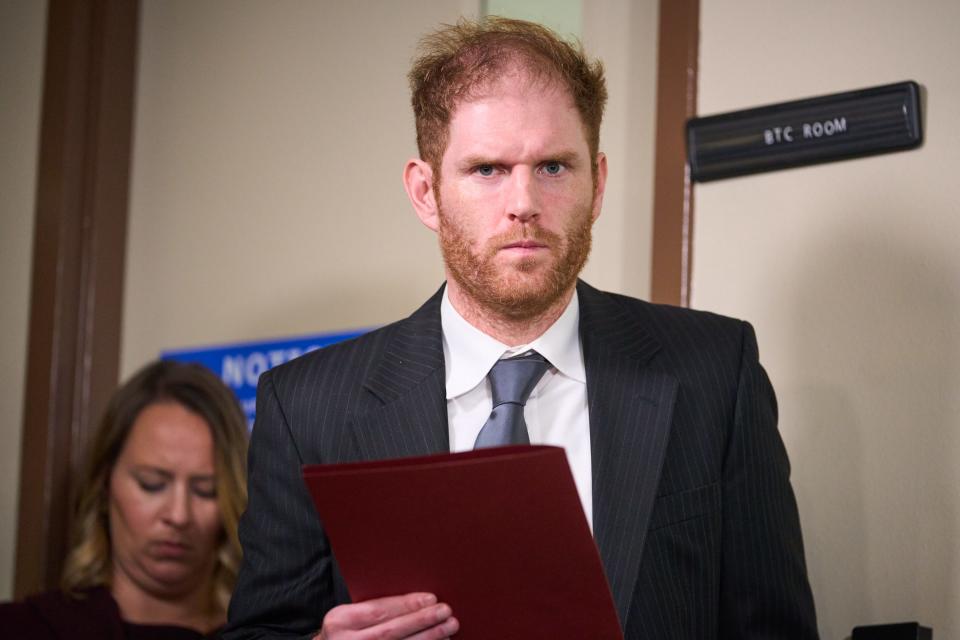
Even if enforcement happens, some say the damage is already done. Campaign finance reports are the only reliable way the public can track who is donating money to county-level candidates and political organizations, and track how they are spending their cash.
Former Arizona Attorney General Terry Goddard, who spearheaded a 2022 voter-approved initiative that requires disclosure of "dark money" in politics, said county election officials' decision not to enforce campaign finance requirement was "a dereliction."
"I don't see how you can justify that," he said. "Frankly, this is a spit in the eye for all the hundreds of committees that do report and go through what I know personally is quite a time-consuming effort."
Groups with large outstanding fines span the political spectrum. They range from small organizations advocating for school bonds to national political action committees.
So far, the cumulative damages total more than $4.4 million — but the final amount could be higher. A county spokesperson said election staffers have tallied fines for political groups but are still working to determine which committees created to support individual candidates owe cash.
County leaders now find themselves in a sticky situation. It's an election year — a tricky time to implement campaign finance enforcement. Some political groups also owe more money in fines to Maricopa County than they have raised during the lifespan of their organization.
That includes We The People Arizona Alliance, an organization that has long spread voting conspiracies and misinformation about election processes. The group owes the county about $1.2 million for five committees created to recall county supervisors after the 2020 presidential contest. Campaign finance records filed with the Arizona Secretary of State's Office show the group has raised just under $1 million since it started.
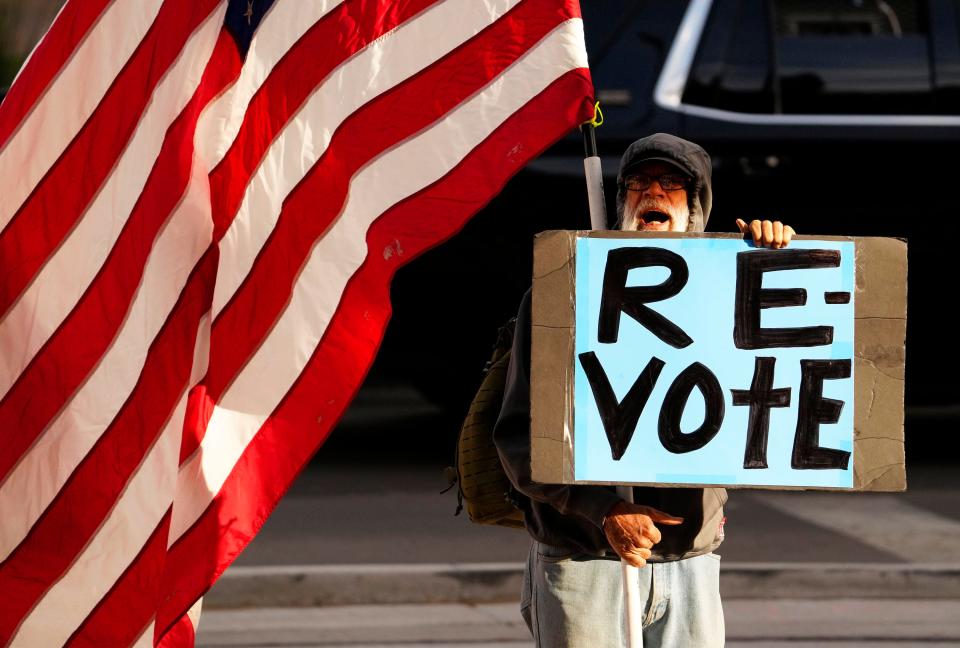
It also includes Citizens for Better Education, an organization created to advocate for the passage of a 2018 bond benefitting the Gila Bend Unified School District. The group raised just under $2,000. Supervisor Steve Gallardo, whose name is on the organization's paperwork, said it was just enough to put up some lawn signs in favor of the bond proposal. It's not nearly enough make a dent in the $309,000 fine that the group has accrued in the years since.
County officials are "seeking legal advice" and aim to develop new policies to be implemented in 2025, according to spokesperson Fields Moseley.
"Staff members are also researching tools that will calculate fines electronically," he said. "In advance of the 2024 campaign cycle, an updated candidate and campaign handbook and in-person and virtual training were developed and made available to candidates and campaigns."
How do others handle campaign finance? Enforcement runs the gamut
State law requires all filing officers — city clerks, county election officials and the Arizona Secretary of State's Office — to notify committees with late or missing reports. It also dictates that committees "shall" file that paperwork according to prescribed schedules.
But it doesn't technically require those filing officers to enforce the penalties.
"If a committee fails to file a complete report within thirty days after the filing deadline and after providing notice... the filing officer may notify the appropriate enforcement officer prescribed in this article," state law reads.
That leads to wildly different policies among agencies statewide. Pinal County Recorder Dana Lewis said she and her staff aggressively enforce campaign finance requirements, educating committees from the get-go on their obligations.

No committee currently owes fines in Pinal County, which is the third-most populous in the state but home to only about one-tenth of the population of Maricopa County. Lewis, who has been in office since 2022, said she couldn't recall a time when she had to refer a case to the Pinal County Attorney's Office. Regular phone calls on late reports tend to do the trick, she said.
"We hound them," Lewis said. "And when it comes to the fines, we collect them."
Pima County officials said they refer campaign finance penalties to county prosecutors for enforcement. Elections Director Constance Hargrove said 18 committees currently owe the county a combined total of $15,000.
That still isn't an "apples-to-apples" comparison with Maricopa County, Hargrove said. Her county, the second largest in the state, has about one-quarter of the population of metro Phoenix and far fewer political groups and candidate committees to keep tabs on.
Plus, the penalties she and her staff can track only date to 2022. Before that, the office kept few records of fines paid and owed by its political organizations.
"There is nothing complete right now," Hargrove said, adding that she and Maricopa County election officials are "kind of in the same place."
Meanwhile, the Secretary of State's Office has long struggled to hold committees accountable for campaign finance missteps. Officials said it's a persistent challenge that has compounded over numerous administrations, much like Maricopa County's campaign finance woes.
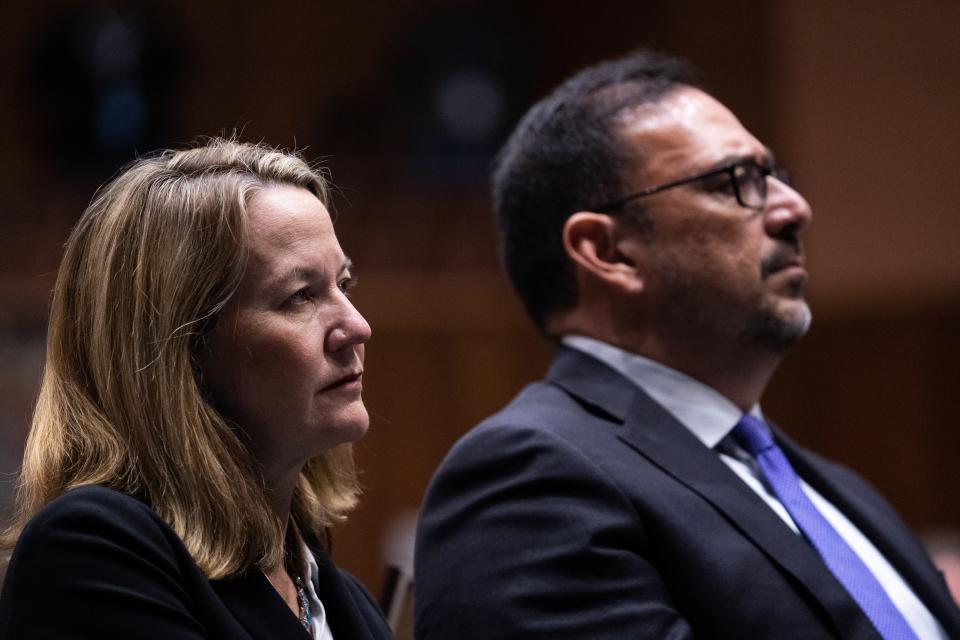
State staffers are continuously trying to catch up on a backlog of campaign finance penalties. The Secretary of State's Office most recently sent a batch of referrals from early 2023 to Attorney General Kris Mayes — meaning it is more than a year behind on enforcing late and missing reports.
Hargrove and Fontes said the state law that gives filing officers discretion in regard to referring cases for enforcement makes it difficult for them to create and defend effective enforcement policies. Fontes said he believes the law should include a stronger legal standard for when filing officers should refer campaign finance cases for enforcement.
"It kind of leaves it open," Hargrove said. "There aren't really any teeth here. It's not saying you have to refer them and they have to pay."
At the state level, the problem also comes down to money and bodies. To properly hold committees to account, Fontes said he'd need another attorney. He said the Attorney General's Office probably would need an extra lawyer and paralegal, too.
"When it comes to enforcement and stuff, sometimes I feel like my hands are tied by the system that says it wants to support this but doesn't actually fund the support necessary or give us the statutory infrastructure within which we can move a process," he said.
Goddard said the intent of the law is clear, regardless of the provision that gives filing officers discretion in their referrals. Election officials just can't let committees get away with violations, he said.
"Essentially, they've vetoed a law," Goddard said. "They've said, 'Oh yeah, it got passed, but we don't really like it.' I don't think that's something you can do."
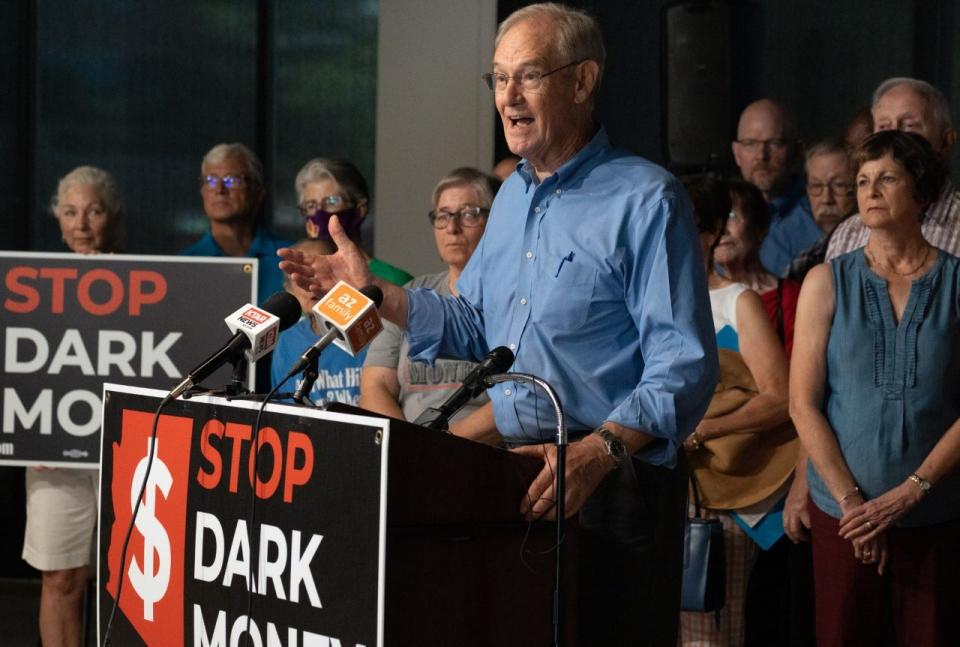
Election officials said penalties go into the state or county general funds if collected. That mechanism is designed to ensure filing officers do not have a direct financial incentive to harshly penalize committees, according to Secretary of State's Office spokesperson JP Martin.
Still, Maricopa County likely wouldn't have seen its millions even if it had been regularly referring campaign finance violations for enforcement. When cases are referred for enforcement, state or county attorneys usually negotiate fines with political groups and candidates. They often drop penalties entirely if the group or candidate hand over the missing documents.
"That's kind of a case-by-case basis," Goddard said. "But usually, the public officer will take the position that it's more important to get the disclosure than it is to get a pound of flesh."
Who takes the blame?
Leaders of several organizations that owe large fines told The Republic they weren't aware of them.
"This comes as news to me," said Green Party of Maricopa County Chair Cody Hannah when The Republic reached out for comment on the $60,000 his registered political party owes in penalties.
Many said they believed their political committees had been terminated years ago. That process requires special paperwork to be turned in to county election officials. Once a committee is terminated, it doesn't have to turn in future reports. But if old, required reports haven't been filed, fines will continue mounting, and any previously outstanding penalties must still be paid.
"Why they didn't terminate, I don't know," said Gallardo, the county supervisor listed as a contact with Citizens for Better Education. "I was never aware this was not filed."
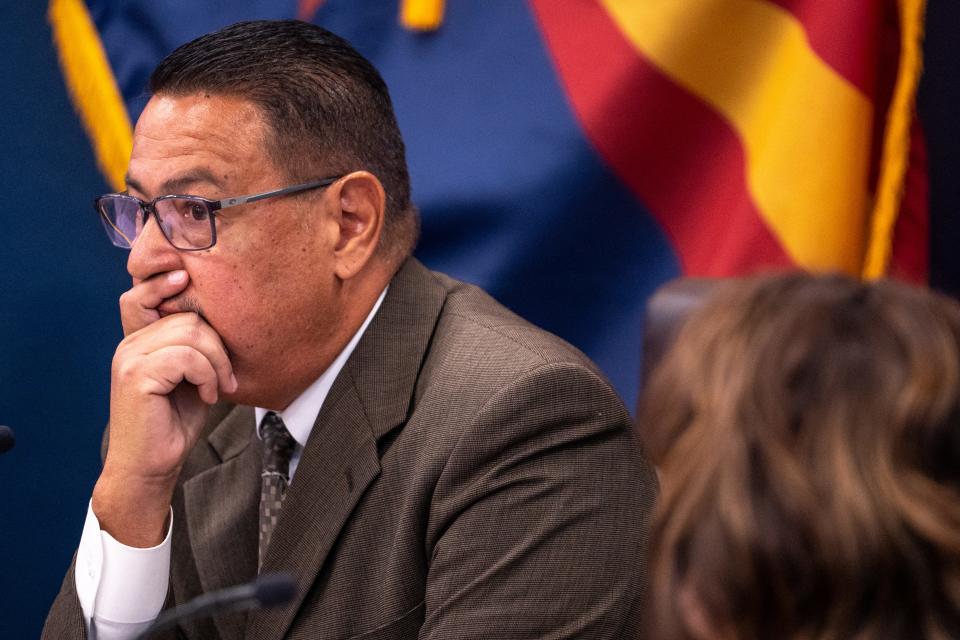
But county election officials said they sent out notifications to political organizations when they missed deadlines. The messages were sent to email addresses listed on each group's statement of organization, a document that is filed when a political committee is founded. That document is supposed to be updated whenever contact information changes for an organization.
The emails didn't include a tally of outstanding fines but did advise the groups that they had missed a mandatory deadline and that penalties would accrue.
Some leaders received those notifications, and others didn't. Gallardo and Hannah both said they never received a notice. Busch said she remembered receiving at least one email but disregarded it because she believed her group's county-level committees were long terminated.
"I filled out the termination paperwork and sent it to the former treasurer, who said he submitted them," Busch said. "That's just ridiculous — those are inactive accounts."
The groups implicated in the records obtained by The Republic also include national organizations spending dollars at the county level, such as the Working Families Party National PAC, which owes about $309,000 in fines.
Even those well-funded, larger organizations seem to struggle with keeping their contact information up to date. An email sent to the address listed on the progressive political party's statement of organization bounced back as belonging to an attorney who was no longer employed by his firm.
The Republic also sent an email to another address pulled from the group's state level campaign finance documents. Party spokesperson Rob Duffey said the organization had "very limited activity in Maricopa County, if any, in recent years."
"This appears to be an administrative error, although it's obviously a serious one that we are working to correct as soon as possible," he said.
Goddard said political organizations have a responsibility to file reports on time and keep their contact information current. State law mandates that committees must file until termination paperwork is properly submitted, even if those committees aren't taking in or spending cash.
"I think it should be enough to say, 'Hey, you got an obligation to disclose,'" said Goddard, who ran for secretary of state in 2014 but lost to Republican Michele Reagan. "'You're the one who has the records, not me. And get with it. Get it done.'"
But he said the county erred in not enforcing the fines those groups incurred.
"That's sort of saying ... 'We're going to be tough on this,'" Goddard said. "'But oh, by the way, the enforcement is never going to happen.' That threatens the entire system."
New policies in the works
Maricopa County officials are working to find a way out of their current campaign finance conundrum, and said they hope to develop new policies for campaign finance enforcement moving forward.
They didn't share specifics of what options they might be considering, but publicly available documents show county supervisors met in executive session June 10 to receive legal advice pertaining to campaign finance responsibilities.
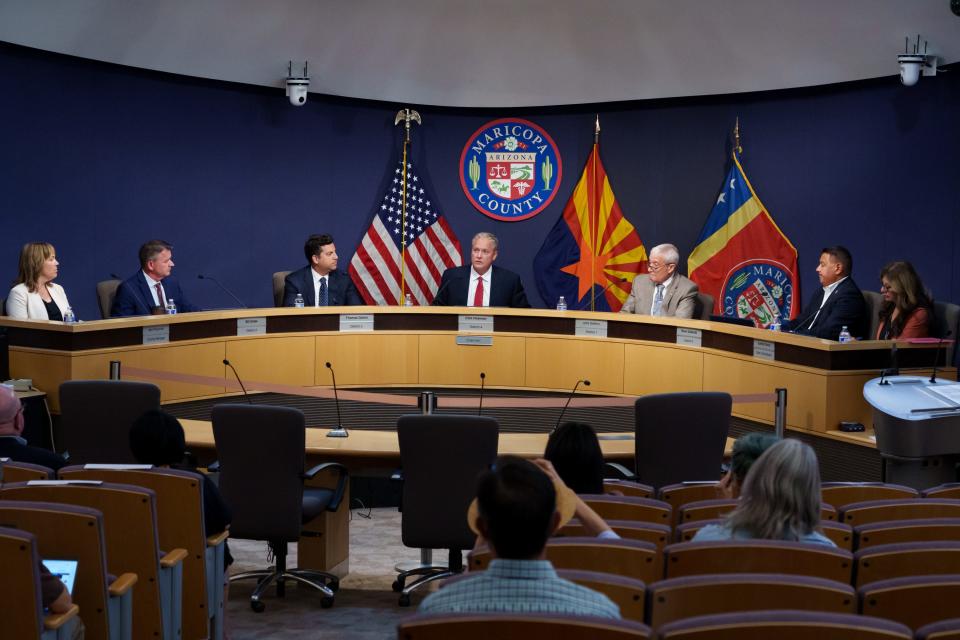
Executive sessions are common in local government. They are allowed under the state's Open Meetings Law in limited circumstances so policymakers can safely discuss sensitive topics in private, such as real estate transactions and legal matters.
Goddard said filing officers typically give "some leniency" to groups with outstanding fines if they "'fess up." County supervisors could opt to wipe the slate clean, but he said the unique situation makes it hard to justify waiving the penalties.
"Part of the leniency usually depends upon getting the filing in," Goddard said. "And if you're talking years late, you've pretty much lost the opportunity to have that be significant."
Gallardo said he intended to immediately work to get his organization into compliance. Hannah said he and his party value being "fully transparent" and it was "a shock" to hear his organization hadn't filed mandatory reports.
But he also noted the Green Party of Maricopa County has never had more than a few thousand dollars in its treasury. He doesn't know what his group would do if forced to pay its fine.
"I find a $60K fine to be more than a bit unreasonable, particularly if nobody was made aware of the issue for several years," Hannah said.
Gallardo said the state's campaign finance regulations need to be revamped because they make it difficult for "the average citizen" to be politically engaged.
"They're more complicated than our tax laws," he said.
He isn't alone. Fontes plans to lobby state lawmakers for changes to campaign finance laws, including a stronger legal standard to describe when filing officers should refer cases to enforcement agencies, and more guidance around how those agencies should handle the violations from there.
He said he's already spoken with Republican leaders in the Arizona Legislature about "genuinely getting engaged in the conversation and doing something real" in 2025. Fontes said he refrained from bringing up the issue this year because he feared it would become a political football amid the current election cycle.
"We have heard time and time again from voters ... that they want more transparency," Fontes said. "And I do, too."
But not everyone agrees reform will solve the problem. Goddard said committees are required to file whether they like the laws or not, and they take an oath pledging to do what they are supposed to.
"There are glitches. I'm not going to say there aren't," he said. "But I don't think any of those are an excuse for not filing. That's a sacred obligation on the candidates that they undertake willingly. And they sign the necessary documents."
If county officials ultimately opt to offer amnesty to groups with big penalties, Goddard said they will have to "admit a fair amount of guilt" in doing so.
"I don't like that, because they never should have been in this hole to begin with," he said. "But I could see where you could get out of it and send a strong message that this wasn't intentional and that we're going to do the enforcement."
How can I find out if my group owes fines to Maricopa County?
The county publishes a campaign finance handbook with information about the campaign finance reporting schedule for political groups. If you visit the county's publicly-available campaign finance database and search for your organization, you can compare the list of required reports to the documents your group has previously submitted to identify whether any are missing or were turned in late.
If reports are missing or late, you can calculate your fine. Tack on $10 per day late for the first 10 days following the report's due date. After that, add $25 per day late to your total.
More information is available on the Elections Department website.
You can contact county election officials via email at CampFin@risc.maricopa.gov.
Sasha Hupka covers county government and election administration for The Arizona Republic. Reach her at sasha.hupka@arizonarepublic.com. Follow her on X, formerly Twitter: @SashaHupka. Follow her on Instagram or Threads: @sashahupkasnaps. Sign up for her weekly election newsletter, Republic Recount.
This article originally appeared on Arizona Republic: Maricopa County ignored campaign finance violations for years

